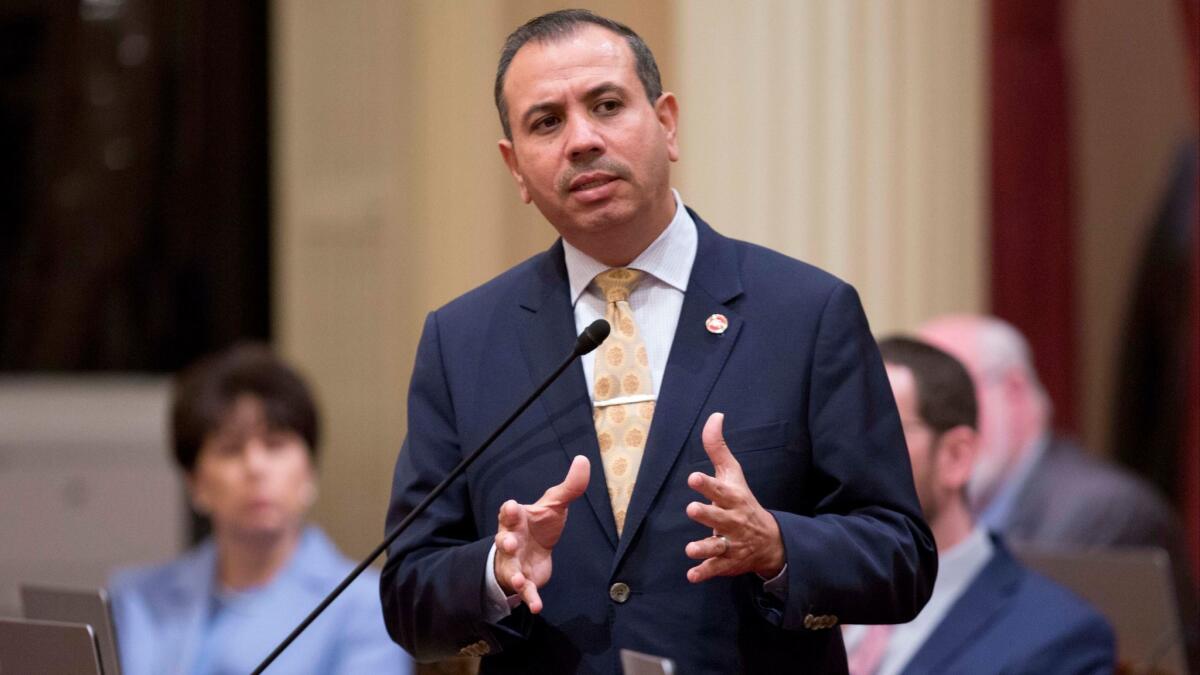Editorial: The California Senate’s opaque rules on sexual harassment make cleaning up Sacramento more difficult

- Share via
An independent investigation ordered by the California Senate has concluded that state Sen. Tony Mendoza (D-Artesia) most likely engaged in inappropriate sexual conduct with six women — five Senate aides and a lobbyist — over the last decade. What’s more, the investigators’ report paints a pattern of abuse of power that continued despite two warnings to Mendoza to leave particular women alone.
If Mendoza were employed by a private company, these findings may well have been sufficient to get him fired the moment the investigation closed. Maybe even before, given the political climate. But because Mendoza is an elected representative, he will get the chance to present his case on the Senate floor, and it will be up to his fellow senators to decide if and how to punish him.
If senators vote to censure or suspend Mendoza, will they seem dismissive of sexual misconduct among their ranks?
On Wednesday, senators struggled behind closed doors with the options. Should they kick him out? The state Constitution allows expulsion for any reason with a two-thirds vote. But that awesome power hasn’t been used for more than a century, and only then to remove four senators accused of accepting bribes. Is sexual misconduct more or less serious than bribery? If senators vote to censure or suspend Mendoza, will they seem dismissive of sexual misconduct among their ranks? If Democrats vote against expelling him, will they be accused of just trying to hang on to their supermajority?
The moment is treacherous for lawmakers in part because they have no road map to follow. The California Legislature has no clear and consistent policies on how to deal with misbehaving colleagues, nor any guidelines spelling out what transgressions might result in which punishment. Instead, legislators take accusations case by case, raising concerns that decisions are tainted by the politics of the moment and by the personalities involved.
For an example of disparate treatment, look back to 2014. A popular senator, Roderick D. Wright (D-Inglewood), was convicted in January of perjury and voter fraud, but the Senate chose to take no action against him until two other senators, Leland Yee (D-San Francisco) and Ronald S. Calderon (D-Montebello), came under separate corruption investigations and all three were suspended with pay.
Mendoza, who was suspended during the investigation, accuses the Senate of lacking consistency in a lawsuit he filed last week challenging the constitutionality of his suspension. For example, he notes that another senator accused of misconduct — Sen. Bob Hertzberg (D-Van Nuys), who is being investigated for ”unwanted hugging” — has not been suspended. There’s an obvious difference in severity between allegedly hugging one’s political associates until they’re uncomfortable and allegedly hitting on young subordinates repeatedly even after being reprimanded, but apparently that distinction needs to be spelled out for Mendoza.
Nevertheless, Mendoza has a point about the failings in the Legislature’s disciplinary procedures, particularly the lack of clear “standards against which his conduct will be judged.” It’s impossible to predict all the transgressions that future lawmakers might engage in, but they can still adopt policies that describe the do’s and don’ts in broad strokes — for example, by noting that serial sexual misconduct involving staff is unacceptable and may be subject to punishment, up to and including expulsion. The Legislature has been moving quickly to examine its policies on sexual harassment and to deal with accusations fairly. All of that will be undermined if there’s a sense that punishment is political rather than logical and rule-based.
There are a handful of sexual misconduct investigations still pending in the Legislature, and two San Fernando Valley assemblymen who were accused, Raul Bocanegra and Matt Dababneh, chose to resign their positions instead of facing discipline. But Mendoza doesn’t seem inclined to slink away, and so he will likely be the first state legislator to face disciplinary action for sexual misconduct since the #MeToo movement got underway. There will be tremendous pressure for senators to make the right choice, whatever that is. If only they had some guidelines to help them.
Follow the Opinion section on Twitter @latimesopinion and Facebook.
More to Read
A cure for the common opinion
Get thought-provoking perspectives with our weekly newsletter.
You may occasionally receive promotional content from the Los Angeles Times.









